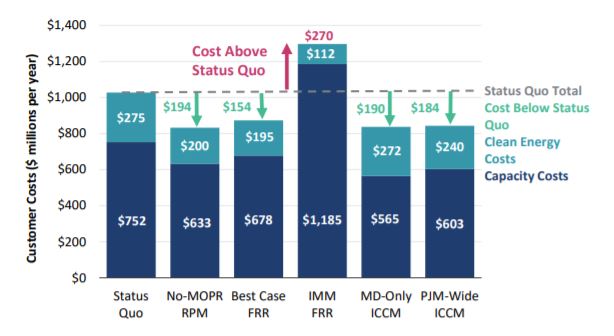Maryland Energy Administration and The Brattle Group Release Study on PJM Capacity Market and Minimum Offer Price Rule

Last year, the Maryland Energy Administration (MEA) commissioned a study from The Brattle Group to better understand PJM’s capacity market under the Minimum Offer Price Rule (MOPR) and its impact on Maryland. The study examines alternatives and approaches to the PJM capacity market under MOPR and provides recommendations for the state going forward.
Background
Maryland has relied on competitive wholesale markets within the PJM Interconnection (PJM) regional transmission organization to procure low-cost and reliable power for 20 years, saving on the order of $270-340 million per year from wholesale power market participation. While participating in PJM has reaped benefits, recent decisions at the Federal Energy Regulatory Commission (FERC) have started to infringe on Maryland’s energy policies and the state’s jurisdiction over its energy mix. FERC, through its oversight of PJM, has created a potential long-term conflict with Maryland’s mandated transition to a further decarbonized power supply via the 2019 Clean Energy Jobs Act, which requires a 50% renewable power supply by 2030. The December 2019 order from FERC made subsidized generation more costly in the capacity market, and states have been left attempting to determine ways to address this issue.
Mitigating unnecessarily high cost increases for customers and the state while incorporating Maryland’s environmental priorities is paramount as we weigh the response options to MOPR or determine if something like a Fixed Resource Requirement (FRR) or Integrated Clean Capacity Market (ICCM) might be necessary. In order to fully understand the impact of MOPR on Maryland and its energy policymaking, and in order to explore options available for managing or mitigating these impacts, MEA commissioned the study, Alternative Resource Adequacy Structures for Maryland, with The Brattle Group to provide the necessary information for a more informed policy-making process. While changes at FERC, and recent deliberations by PJM in response to the MOPR are encouraging for mitigating or nullifying the negative aspects of the Order, Maryland will still be prepared and informed if these issues are not resolved.
The Maryland Energy Administration (MEA) advises the governor and general assembly on all energy matters, promoting affordable, reliable and cleaner energy. MEA develops and administers programs and policy to support and expand all sectors of the state’s economy while benefiting all Marylanders and implementing legislation. For more information about the Maryland Energy Administration, visit www.Energy.Maryland.gov and follow us on Facebook, Twitter and LinkedIn.

 1-888-373-7888
1-888-373-7888 233733
233733